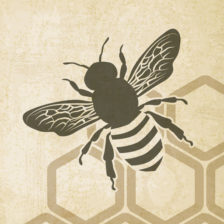Ted (Technology, Entertainment, Design) talks encompass a large range of “ideas worth spreading.” Among these the following help provide background information on honey bees, important in educating the general public about these insects and their role in pollinating plants. If you find more, please let me know beeactor@apisenterprises.com.
Honey bees have thrived for 50 million years, each colony 40 to 50,000 individuals coordinated in amazing harmony. So why, seven years ago, did colonies start dying en masse? Dr. Marla Spivak reveals four reasons which are interacting with tragic consequences. This is not simply a problem because bees pollinate a third of the world’s crops. Could this incredible species be holding up a mirror for us? Dr. Spivak is Distinguished McKnight Professor at the University of Minnesota, St. Paul Campus. Published on Sep 17, 2013
Dr. Spivak also provided a talk on “Pollinators in Peril” in May, 2015. In this hour-long presentation she discussed issues surrounding loss of honey bee colonies associated with pesticides (including neonicotinoids) as well a effects of those chemicals on other pollinators. Finally, she looked at the foods pollinated by insects and the valuable service that this provides to the food supply.
This talk was given at a local TEDx event, produced independently of the TED Conferences. Beth Conrey, President of the Western Apicultural Society (WAS) explains how ecosystem biodiversity and worldwide food production are connected, which are both anchored by a healthy bee population. Published on Nov 7, 2014
Here’s a remarkable bit of footage showing the first 21 days of a bee’s life and associated mites by the photographer assigned to illustrate the May 2015 issue of National Geographic Magazine.
The beauty of pollination is the title of this talk that looks at pollinating activities of insects (butterflies, orchid bees, honey bees) and mammals (bats in the desert night sky). Published May 7, 2015.
Why cities need bees by Noah Wilson-Rich studies bees and bee diseases. He founded Best Bees Company to support people who want to own and care for their own beehive. Full bio · Filmed ·
Dr. Joseph Wilson, Utah State University, looks at wild (native, Non-Apis) bees. He discusses buzz pollination, bee mimics, native bees (most species), while the honey bee is only one of thousands of bees. Most Basic needs for bees are food and nesting sites. How to “save the bees” if we don’t know and can’t identify bonafide bees, 8 minutes, 40 seconds.
Danielle Bilot argues that urban areas can help save the bees – it’s simply a matter of design. See this TedXMile High talk looks at how this might happen via designing better parking lots, 14 minutes.

